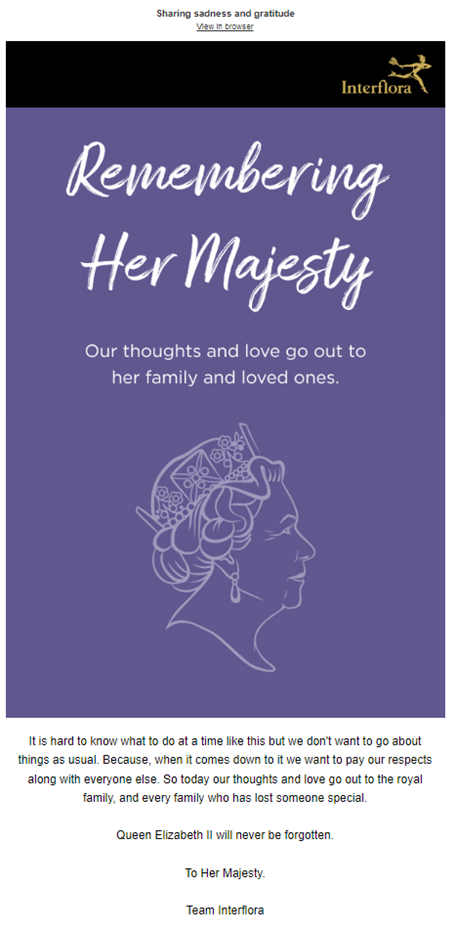3 Reasons Email Marketing excels in a crisis
The world has had its fair share of crisis, I don’t need to remind you of the pandemic we’re still recovering from!
In the UK, our nation has been catapulted from one unrest to the next. From Brexit and the Pandemic, to the rising fuel costs and now to the passing of Queen Elizabeth II. The impact on consumer mood has been significant.
It is clear from our inboxes here in the UK that at these times that brands turn to email to speak directly to their consumers. Whether you agree that a trendy clothing brand should be sending messages of condolences to their audiences, the fact is brands are using email time and time again to speak directly to individuals. This blog is not to debate whether I think it’s their place to do so, but to unpick why email marketing is a reliable channel of choice to not only transact with consumers, but speak with them regarding key societal matters.
There’s no doubt we love email marketing, it’s a great direct response channel – and what other channel can boast a £38:£1 ROI?! But email marketing is more than just a transactional channel. Many brands realise this in times of a crisis.
Here’s 3 reasons why email excels in a crisis:
1. Your audience wants to hear from you – Empathy is key
If your audience is experiencing a particular change or crisis, then the worst thing you could do is ignore it. McKinsey reported that companies that lead with empathy and address customer needs can strengthen long term relationships.
Post pandemic marketers have better understood the need to demonstrate empathy. It’s not what you say it is how you say it.

2. It’s one to one
The ability to personalise the conversation is where email marketing comes into its own. Segmenting your audience based on demographics or behaviour and personalising the messaging can be key to getting the tone right.
Don’t forget that this is a conversation, don’t send emails from a @noreply – keep the communication channels open and ensure you respond!

3. It’s quick and easy to send
It is good practice for every brand that sends emails to have an “emergency” email template ready to use in times of urgency. This ensures that all you need to do is get the content right and send. But remember don’t be too hasty – check your content and ensure the tone is right.
Here’s 3 things you need to remember when using email marketing in a crisis
1. Think about relevance first
It is important to take a step back before you start reacting to what you are considering to be a crisis. Is this a crisis that your whole audience is going through? Is it political or divisive? And does it fit with your own values as a business. So many brands make a stand to societal critical issues, yet receive backlash when their own internal values don’t reflect what they’re saying to their audiences.
Does it make more sense to say nothing at all and reduce your mailings, than to react and not be authentic?
2. Rethink your tone on other emails
If you have automations set up, think about whether these triggers are relevant right now. Assess the content and the tone of these messages – are they reflective of your crisis messages? Automations are often set up and forgotten over time, here are some of the emails you should be reviewing:-
- The welcome series
- Birthday Offers
- Abandoned Basket
- Re-engagement
3. Deliverability
As we saw during the pandemic some businesses were sending many more emails than they were previously and others sending much less. However, many forgot about the impact this would have on deliverability. A sudden increase, or even decrease, in sends can send warning signals to ISP’s that sending behaviour is erratic therefore damaging your sending reputation and delivering your emails to the spam folder.
It is important to think about how you ramp up your crisis messages, or even how you wind down sending to manage your inbox deliverability.
During the pandemic Validity launched their Validity for Good solution which enabled large businesses, governments etc. with free email delivery certification for all crisis communications for those that qualify.
To conclude
Email marketing is and will always be one of the best communications channels for crisis management. But it is essential that brands think about the communication’s relevance to the audience they are speaking with and ensure that at all times authenticity is at the heart of everything they do.
 Photo by Jason Leung on Unsplash
Photo by Jason Leung on Unsplash

 How to resolve AdBlock issue?
How to resolve AdBlock issue? 
